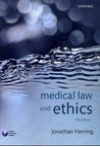- Author(s): Jonathan Herring
- Publisher: Oxford University Press
- Edition: 5 Ed 2014
- ISBN 13 9780198702269
- Approx. Pages 659+contents
- Format Paperback
.........................................................................................................................
Description
Medical Law and Ethics covers not only the core legal principles, key cases, and statutes that govern medical law, but also explores the key ethical debates and dilemmas that exist in the field to ensure that the law is firmly embedded within its context.
Carefully constructed features highlight these debates, drawing out the European angles, religious belief, and feminist perspectives which influence legal regulations. Other features such as, 'a shock to the system', 'public opinion', and 'realty check' introduce further sociological aspects, contributing to the lively and engaging manner with which the subject is approached.
Key updates to this new edition are :
• Coverage of the Health and Social Care Act 2013 and the changes in the structure of the NHS
• Important case law developments on the law on mental capacity and enthuanasia, including the Nicklison litigation, the decision of the Supreme Court in James, and the Assisted Dying Bill
.........................................................................................................................
Contents
1 Ethics and Medical Law
1. What is medical law?
2. The nature of illness
3. The scope of medicine
4. The sociological impact of being ill
5. Health statistics
6. General ethical principles: introduction
7. The notion of rights
8. Patients' obligations
9. Principlism
10. Hermeneutics
11. Casuistry
12. Feminist medical ethics
13. Care ethics
14. Virtue ethics
15. Communitarian ethics
16. Theology
17. Relativism
18. Pragmatism
QUESTIONS
FURTHER READING
2 The Structure of the National Health Service and the Rationing of Healthcare Resources
1. What are the principles underpinning the NHS?
2. The structure of the NHS
3. Policymaking and central planning in the NHS
4. Quality control: regulation and inspection
5. Commissioning and planning services
6. Charging: community versus health care
7. The provision of services
8. Structural issues
9. Rationing
10. Health inequalities
11. The General Medical Council
13. Public health: infectious diseases
14. Public health: prevention
QUESTIONS
FURTHER READING
3 Medical Negligence
1. The law and medical malpractice: an overview
2. Criminal law
3. The law of negligence
4. The law of contract
5. Why do people sue?
6. Medical malpractice litigation in practice
7. Costs
8. Criticisms of the current legal position
9. Learning lessons
10. The NHS Redress Act 2006
11. No fault
12. Matters other than compensation
13. Medicines and law
14. Conclusion QUESiNS FURTHER READING
4 Consent to Treatment
1. The consequences of treatment without consent
2 Who must provide the consent?
3. Who has the burden of proving consent?
4. What is consent?
5. Actions in negligence based on a failure to provide sufficient information
6. Professional guidelines
7. The non-consenting competent patient
8. The treatment of patients lacking capacity
9. Consent of children
10. Treatment that cannot be consented to
11. Ethics and autonomy
12. Ethics and best interests
13. Ethical issues surrounding advance directives
14. Autonomy and the medical professional-patient relationship
15. The ethics of child treatment
16. Conclusion
QUESTIONS
FURTHER READING
5 Confidentiality
1. The legal basis of confidentiality
2. Denying breach of confidentiality
3. Justifying breach of confidence
4. The Data Protection Act 1998
5. Problem issues
6. Legal remedies in confidentiality cases
7. Access to information
8. The ethical issues
9. Informational privacy
10. Conclusion
QUESTIONS
FURTHER READING
6 Contraception, Abortion, and Pregnancy
1. Contraception: its use and function
2. The availability of contraception
3. Teenage pregnancy rates
4. Abortion and contraception
5. Contraception and children
6. Contraception, sterilization, and those lacking capacity
7. Tort liability and contraception
8. Ethical issues concerning contraception
9. An introduction to abortion
10. Abortion: the law
11. Abortion: the reality
12. The legal status of the foetus
13. Abortion ethics
14. Particularly controversial abortions
15. Pregnancy and childbirth
16. Regulating pregnant women
17. Caesarean section cases
18. Conclusions
QUESTIONS
FURTHER READING
7 Reproduction
1. Infertility
2. The concept of reproductive autonomy
3. Criticisms of assisted reproduction
4. The different techniques
5. Regulation
6. Criticisms of the HFEA
7. Access to treatment
8. Parentage
9. Gamete donation: anonymity
10. Payment for gamete donation
11. Surrogacy
12. Preimplantation genetic screening
13. Cloning
14. Therapeutic cloning and embryo research
15. Genetic enhancement and eugenics
QUESTIONS
FURTHER READING
8 Organ Donation and the Ownership of Body Parts
1. The Human Tissue Act 2004
2. Comments on the Human Tissue Act 2004
3. Transplanting of organs
4. Liability for mishaps from organ transplant
5. The lack of organs
6. The wishes of relatives
7. Xenotransplantation
8. Selling organs
9. Face transplants
10. The living body as property
11. Intellectual property
12. Conclusion
QUESTIONS
FURTHER READING
9 Dying and Death
1. What is death?
2. The law and the end of life
3. Applying the law in difficult cases
4. Alleged inconsistency in the present law
5. Ethical issues: euthanasia
6. Patients lacking capacity: ethical issues
7. Refusal of treatment: ethical issues
8. Advance directives
9. Palliative care and hospices
10. Reform of the law
11. Conclusion
QUESTIONS
FURTHER READING
10 Mental Health Law
1. Statistics on mental health
2. The Mental Health Act 1983
3. Informal treatment
4. Codes of practice
5. The reforms to the law under the 2007 Act
6. Protection from abuse
7. Human rights
8. Problems in mental health practice
9. Critics of mental health
10. Dangerousness
11. Paternalism as the ground for detention?
12. Conclusion
QUESTIONS
FURTHER READING
11 Research
1. The legal regulation of research
2. Research that is outlawed on the grounds of public policy
3. Research involving children
4. Research involving incompetent adults
5. Research in the context of emergency treatments
6. Experimental treatment
7. Consent to research
8. Payment
9. The licensing of research
10. Selecting participants
11. Publication fraud
12. An obligation to participate?
13. Disclosure of results
QUESTIONS
FURTHER READING
Note on the Bibliography
Index
.........................................................................................................................
Author Details
Jonathan Herring : Professor of Law Exeter College, University of Oxford
.........................................................................................................................

